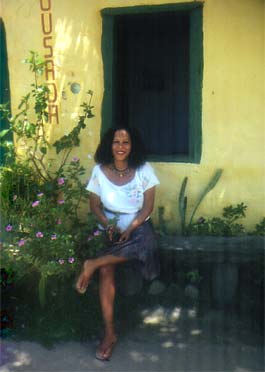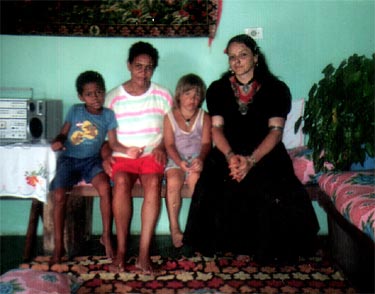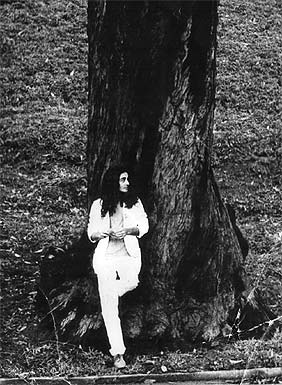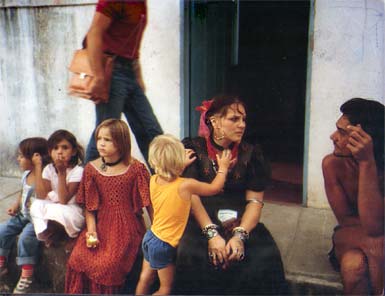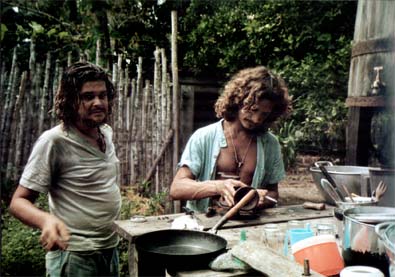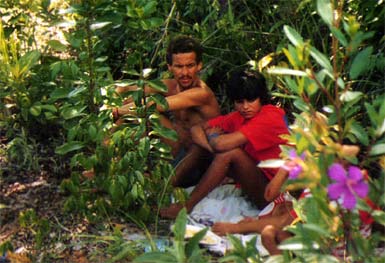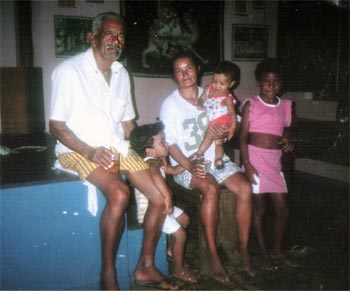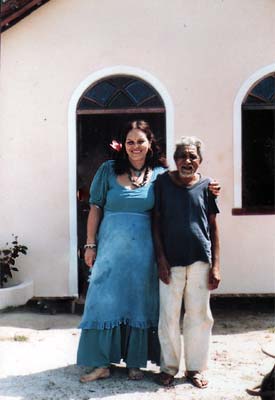| |
|
|
|
|
| |
|
|
|
| |
|
|
|
|
| |
|
One of
the first things we learned in Brazil was that the word "friend"
has a different meaning in various cultures. In Trancoso everybody was our
friend as long as we still had some lolly. After we ran out of it, we soon
found out who our real friends were: Not many, but very special and precious
people all. Here's a few of those. |
|
|
| |
|
|
|
|
| |
|
|
|
|
| |
|
Dora
in front of her pousada |
|
|
| |
|
|
|
|
| |
|
Dora grew up near
Salvador, the capital of Bahia, so her cultural background differs greatly
from that of the locals. She used to run a small pousada, nowadays
she owns a rather chic restaurant. |
|
|
| |
|
We both had our third
child at the same hospital in Salvador, with only 3 days in between. |
|
|
| |
|
|
|
|
| |
|
|
|
|
| |
|
|
|
|
| |
|
with
Zilda and her son Quíto |
|
|
| |
|
|
|
|
| |
|
Zilda was my neighbor
and still is a good friend. She's a cheerful person who helped me whenever
I needed some assistance, and a gifted tailor to boot. Zilda is a real native
of Trancoso, and related to at least half of the original inhabitants. As
a mother of eight, her life was not always easy. Nowadays she is a multiple
grandmother, and from what my daughter tells me, she managed to get a bit
of a business running, so it seems that through persistence and hard work,
she was able to improve her lot and the living standard of her big family. |
|
|
| |
|
I felt touched and
honored when Fatima told me that Zilda had one of her grandchildren named
after me. |
|
|
| |
|
|
|
|
| |
|
|
|
|
| |
|
|
|
|
| |
|
Ricardo |
|
|
| |
|
|
|
|
| |
|
Ricardo
is a very special friend of mine, and a great expert on all kind of plants.
He taught me a lot. This is a very old pic of him, chosen because it characterizes
him perfectly. |
|
|
| |
|
|
|
|
| |
|
|
|
|
| |
|
|
|
|
| |
|
|
|
|
| |
|
|
|
|
| |
|
|
|
|
| |
|
|
|
|
| |
|
Sylvia |
|
|
| |
|
|
|
|
| |
|
Sylvia worked at the restaurant in its first year. |
|
|
| |
|
She's a very special person, a beautiful, independent and strong woman.
An orphan, she was brought up by nuns somewhere in the South; a traumatic
time for her freedom-loving spirit. We never heard of her again after she
and her little boy left Trancoso for some place where, if I remember correctly,
she wanted to grow sesame plants. Wherever she is now, my best wishes are
with her! |
|
|
| |
|
|
|
|
| |
|
|
|
|
| |
|
One of the most remarkable
people we met in Bahia was a Brazilian Japanese called Pedro. The owner
of two restaurants and a store near Porto Seguro was an incredibly generous
and cheerful person and a workaholic if ever I knew one. I don't think he
rested any more then 4 hours a night. He'd close his place past midnight
and get up at dawn to do some fishing. His catch he would present us, on
an enormous, beautifully decorated platter, raw as sashimi an hour
later on seeing us descending from the bus on our way to town. Or he'd appear
in Trancoso with a huge bucket filled with giant fresh shrimp, a present
for family and staff to be prepared and devoured on the spot. Often he sent
by bus a crate full of fresh fruit from the south for my kids. |
|
|
| |
|
|
|
|
| |
|
Sadly, Pedro, father
of a teenage boy and a sweet little daughter, died around 1990. Rest in
peace, my friend. Unfortunately, I don't even have a photo of him. |
|
|
| |
|
|
|
|
| |
|
|
|
|
| |
|
|
|
|
| |
|
chatting with João |
|
|
| |
|
|
|
|
| |
|
João was another
good friend who isn't among us anymore. He chose to live life on the fast
and dangerous lane. May he rest in peace too. |
|
|
| |
|
|
|
|
| |
|
|
|
|
| |
|
|
|
|
| |
|
Vegetal
and João dos Côcos |
|
|
| |
|
|
|
|
| |
|
One of
the few "friends" who didn't drop us when we had no money left
was a long haired freak of German descent, called Vegetal by the
locals for his vegetarian habit. Vegetal owned a house, a few horses that
lived more or less on the village green and some property. He often invited
us to share the meals of rice, beans and vegetables he and his friends prepared.
We became friends, and he not only presented Rashid with a rooster and a
hen, but ourselves with a big piece of land out in the bush. The other guy
in the pic is João dos Côcos, deriving his nick, his
appelido, from his artistic abilities of producing ornamental items
like earrings or pendants out of coconut shells. |
|
|
| |
|
|
|
|
| |
|
|
|
|
| |
|
|
|
|
| |
|
Donato with his wife |
|
|
| |
|
|
|
|
| |
|
Donato was our mason, and accompanied the construction and maintenance
of the Pousada both as a friend and an employee for many years. Another
faithful worker and friend was Dado, unfortunately, I don't have any photo
of him. |
|
|
| |
|
|
|
|
| |
|
Quite
another story is that of a little artisan from the South, (to protect his
identity I'll call him Curtinho here), who did the carvings on the wooden
pillars of our quarters and on the the sign out front. Curtinho turned out
to be a veritable Brazilian version of the famous Count of Munchhausen.
He told us that his mother came from Thailand, where his father had met
her while posted there as an engineer. He claimed to know to write some
Thai characters and used to bake a special Thai bread, the way his mother
had taught him. |
|
|
| |
|
One day
he announced that his father was coming for a visit. Well, I thought, the
man, having lived in Thailand for many years, would sure be pleased to eat
some Asian fare. At lunch, he somewhat surprised me by preferring a fork
in lieu of the supplied chopsticks. Curtinho's father was a nice man, but
didn't add up to what I had expected at all for several other reasons as
well. |
|
|
| |
|
|
|
|
| |
|
|
|
|
| |
|
|
|
|
| |
|
Seu
Frederico with his family |
|
|
| |
|
|
|
|
| |
|
One of our employees,
a clever and experienced fellow by the name of Seu Frederico who
took care of the garden and did some odd jobs, had a conversation with our
friend's father later in the afternoon. What he told us afterwards was truly
astonishing. |
|
|
| |
|
Never
in his life had Curtinho's father been abroad. He was a baker by profession,
and he and his wife, a mother of twenty children, had fled, like thousands
of other unfortunates, from the poverty of the Northeast to the promising
fleshpots of Rio de Janeiro. Most of those hopeful immigrants usually end
up worse off than before: landless, jobless, their home a cardboard and
plywood shack in the favélas. To get back to Curtinho's
family, there was no Thai connection whatsoever, the whole story had been
a product of Curtinho's imagination. |
|
|
| |
|
Poor Curtinho
had to suffer our jokes and the ridicule of half the village. But he wasn't
easily deterred. Hardly a month after his fabrications got exposed, I heard
from some Germans he'd shown around the place what a pleasant and interesting
fellow this little guy with his Thai parentage was. |
|
|
| |
|
|
|
|
| |
|
|
|
|
| |
|
|
|
|
| |
|
with old Irenio |
|
|
| |
|
|
|
|
| |
|
Seu Irenio was said to be the oldest inhabitant of Trancoso. Living in
a small house near the quadrado, he loved to stop by at his friends'
places, ours included, for a free pinga and a few words. After
half an hour or so, the frail old timer would move on, his shaky pace a
bit more unstable after every stop. Around the middle of last century, Seu
Irenio had come to Bahia by ship as a sailor, liked the place and settled
down. |
|
|
| |
|
After his sons had sold his house and forced him to move to quarters some
distance away from the village and his buddies, "velho Irenio",
as he was called, didn't live for much longer. It was kind of revolting
to see how those same sons threw themselves wailing upon his coffin at the
funeral. |
|
|
| |
|
|
|
|
| |
|
Trancoso being such a spot of scenic beauty,
it got frequented by quite a few Brazilian singers and actors. Music legend
Gilberto Gil turned up a few times; I had a chat with him and even was invited
to his birthday bash in Porto. |
|
|
| |
|
Yet another singer enchanted with Trancoso was
Marisa Monte, who owned a house down at the beach. She used to befriend
one of Zilda's daughters and Fatima's best friend. |
|
|
| |
|
Sonja Braga, a Brazilian actress known world-wide
for her leading part in "The kiss of the spider woman" also used
to visit Trancoso. Without make-up she was a rather plain looking, long-haired
small woman who for a time had a liaison with one of the rich southern dropouts
living in the village. One night at her boyfriend's house, the couple became
victims of an assault by a gang of five criminals. The house owner knew
to defend his property though, and the raid ended deadly for two of the
bandits who got shot. The rest just about managed to escape. |
|
|
| |
|
|
|
|
| |
|
As an aside, I've never met a people who can talk about sex
in such an open, lighthearted and unembarrassed way as Brazilians do. What
to a great part of humankind means hushed confidences accompanied by shameful
glances and some blushing thrown in for good measure, to many Brazilians
is a topic hardly different from the weather or what they had eaten for
lunch. It seems not to make a difference at all to them to talk about their
knees, their head or their reproductive organs. Takes a bit of getting used
to, but being an outspoken person myself, I rather enjoyed that openness. |
|
|
| |
|
|
|
|
| |
|
|
 |
|

